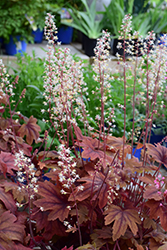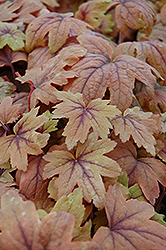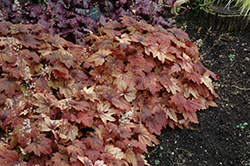>> Home
Sweet Tea Foamy Bells
Heucherella 'Sweet Tea'
Height: 26 inches
Spacing: 24 inches
Sunlight:
![]()
![]()
Hardiness Zone: 4a
Brand: Terra Nova Nurseries
Description:
A vigorous shade plant with dainty flowers and stunning foliage; beautiful orange leaves with prominent burgundy centers and veins; an excellent color accent for the garden or containers
Ornamental Features
Sweet Tea Foamy Bells is primarily valued in the garden for its distinctive form, with the flower stalks towering over the foliage. It features dainty spikes of creamy white bell-shaped flowers rising above the foliage from mid spring to early summer. The flowers are excellent for cutting. Its attractive deeply cut lobed leaves remain coppery-bronze in colour with distinctive burgundy veins throughout the year. The black stems can be quite attractive.
Landscape Attributes
Sweet Tea Foamy Bells is a dense herbaceous evergreen perennial with tall flower stalks held atop a low mound of foliage. Its relatively fine texture sets it apart from other garden plants with less refined foliage.
This is a relatively low maintenance plant, and should be cut back in late fall in preparation for winter. It is a good choice for attracting hummingbirds to your yard. It has no significant negative characteristics.
Sweet Tea Foamy Bells is recommended for the following landscape applications;
- Mass Planting
- Rock/Alpine Gardens
- Border Edging
- General Garden Use
- Groundcover
- Container Planting
Planting & Growing
Sweet Tea Foamy Bells will grow to be about 20 inches tall at maturity, with a spread of 28 inches. When grown in masses or used as a bedding plant, individual plants should be spaced approximately 24 inches apart. Its foliage tends to remain dense right to the ground, not requiring facer plants in front. It grows at a medium rate, and under ideal conditions can be expected to live for approximately 10 years. As an evegreen perennial, this plant will typically keep its form and foliage year-round.
This plant does best in partial shade to shade. It prefers to grow in average to moist conditions, and shouldn't be allowed to dry out. It is not particular as to soil type or pH. It is somewhat tolerant of urban pollution. Consider applying a thick mulch around the root zone in winter to protect it in exposed locations or colder microclimates. This particular variety is an interspecific hybrid. It can be propagated by division; however, as a cultivated variety, be aware that it may be subject to certain restrictions or prohibitions on propagation.
Sweet Tea Foamy Bells is a fine choice for the garden, but it is also a good selection for planting in outdoor pots and containers. With its upright habit of growth, it is best suited for use as a 'thriller' in the 'spiller-thriller-filler' container combination; plant it near the center of the pot, surrounded by smaller plants and those that spill over the edges. Note that when growing plants in outdoor containers and baskets, they may require more frequent waterings than they would in the yard or garden. Be aware that in our climate, most plants cannot be expected to survive the winter if left in containers outdoors, and this plant is no exception. Contact our experts for more information on how to protect it over the winter months.


